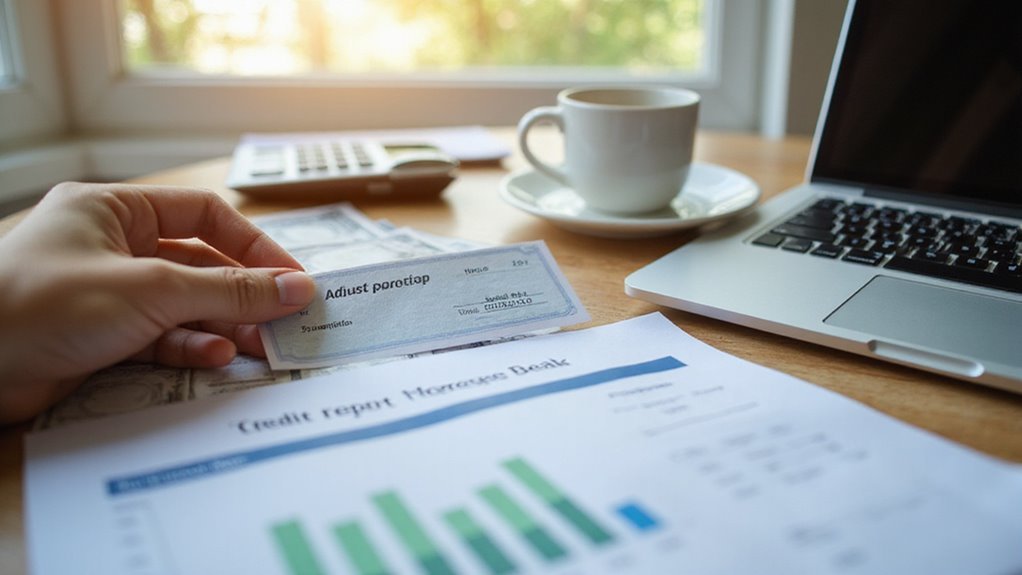


Many people with student loans wonder if paying them off will help their credit score. Student debt can feel overwhelming. You may hope that clearing it will quickly improve your financial standing and open new doors. The reality is not always that simple.
Paying off student loans might not instantly boost your credit score. Your score depends on several factors, such as your payment history and credit mix. Some people even notice a small drop in their score after paying off a loan because it changes their credit mix and history length.
Paying off student loans can help your credit score, but the effect may not be as dramatic or immediate as you expect. This blog will break down how student loan repayment affects your credit score and what you can do to make the most of it.

Credit scores are calculated using specific financial factors. Lenders look at your payment history and how much you owe. They also check how long you have used credit. The types of credit you use and recent credit checks matter too. Making payments on time helps your score the most. Keeping your credit card balances low is also important. If you see mistakes on your credit report, you should fix them. Credit counseling services can help if you feel unsure. They explain how your choices affect your score. They also help you plan ways to improve your score. If you understand these factors, you can make better financial decisions. Regularly reviewing your credit report activity can help you spot suspicious changes early and protect your financial identity. Additionally, using credit monitoring services can provide real-time alerts and help you track your credit health over time.
When you have student loans, they influence several aspects of your credit profile, including credit utilization, payment history, and the overall age and mix of your accounts. Your ability to manage regular payments plays a key role in shaping your creditworthiness. Additionally, student loans add diversity and length to your credit history, both of which can impact your score. Timely payments on student loans are particularly important, as payment history accounts for 35% of your FICO score and has a significant effect on your overall credit health. If you notice any discrepancies or have questions about how your student loans are reported, it’s important to review your credit report regularly and know how to file a dispute online if you suspect an error.
Student loans are installment debt and do not count toward credit utilization. Credit utilization measures how much of your credit card limits you use. Student loans do not have a credit limit, so paying them off does not change this ratio. If you pay off student loans, your total debt goes down. Lower debt can make you look better to lenders. Lenders may see you as less risky if you owe less overall. However, credit utilization scores focus on credit cards, not loans. This means the effect of paying off student loans is indirect.
Payment history is the most important part of your credit score. Student loan payments strongly affect your credit profile. On-time payments show lenders you are trustworthy. Late or missed payments can lower your score for several years. Installment loans, such as student loans, help diversify your credit mix. Your student loan accounts also increase the average age of your credit. If you pay on time, your score will improve. A good payment record makes you look reliable to future lenders.
The age and variety of your student loans affect your credit score. Older loans show you can handle debt for a long time. If you pay off your oldest loans, your average account age may drop. This can lower your credit score. Your credit mix is also important. Student loans are installment loans, not like credit cards. If you do not have other installment loans, your credit mix could weaken. These factors matter less than payment history but still impact your credit score. If you want to keep a strong score, consider these points before paying off student loans early.
Your payment history holds the most weight in determining your credit score, so making payments on time is crucial. If you miss payments, those late marks can remain on your report for years and significantly lower your score. When you pay off your loan, the way your lender reports the closure also affects your credit profile. Payment history actually accounts for 35% of the FICO score, making it the single most influential factor in your overall credit rating. Maintaining consistent on-time payments can help you achieve a good credit score range and unlock better financial opportunities.
Timely payments are the most important factor in building good credit. Payment history makes up about 35% of your FICO score. Each on-time student loan payment shows you manage money well. Credit bureaus record every payment you make. If you pay on time, your credit history gets stronger. Lenders may see you as less risky if your record is good. Positive payment activity can increase your credit score for a long time.
Missed student loan payments can hurt your credit for years. Even one late payment lowers your credit score right away. Payment history is a big part of your credit score. Late payments stay on your credit report for up to seven years. Recent or frequent missed payments cause more harm. If you pay on time after missing a payment, the negative mark still affects your score. Credit recovery takes time and regular on-time payments. If you want to rebuild your credit, you must pay every bill by its due date.
Paying off a student loan can affect your credit score in several ways. When you close a student loan, the lender tells the credit bureaus. Your payment record on that loan stays in your credit report. If you made payments on time, your score may go up. A closed loan marked “paid as agreed” looks good to future lenders. The closed account still counts toward your credit history length. Paying off loans can lower your total debt, which can improve your profile. Accurate reporting of closed loans is important for your credit health.
Credit utilization measures how much of your credit card limit you use. Student loans do not count toward this ratio. They are installment debt, not revolving credit. If you have student loans, they are considered separately by lenders. If you are concerned about protecting your credit while managing debt, you might also consider placing a credit freeze to help prevent unauthorized access.
You should always make student loan payments on time. A low debt-to-income ratio also helps your credit profile. These actions show good financial habits, even though they do not change your credit utilization rate. If you understand this, you can better manage both your student loans and credit cards. Lenders may also consider your payment history when evaluating your credit for major purchases, making on-time student loan payments especially important.

When you pay off a student loan, you change your credit mix by reducing the variety of active account types on your report. Lenders weigh both the diversity and status of your accounts—open loans show ongoing management, while closed loans indicate settled debt. A well-managed credit profile typically includes both installment and revolving accounts, so eliminating an installment loan could affect how lenders evaluate your creditworthiness for future applications. To maintain a balanced credit profile, you’ll want to consider how eliminating an installment loan affects your overall mix of revolving and installment credit. It’s important to note that both credit freezes and locks can impact how and when lenders access your credit report, which may be relevant if you’re planning to apply for new credit after paying off your loan.
Paying off student loans can affect your account diversity. Lenders like to see different types of credit, such as loans and credit cards. If your student loan was your only installment account, closing it reduces your credit mix. This may cause a small drop in your credit score.
Here are some examples:
A mix of account types is helpful for your credit profile.
An open account is active, while a closed account is paid off and inactive. Paying off a student loan closes the account. The closed loan still shows up on your credit report. It helps your credit age, which is good for your score. However, it no longer counts as active credit. If you have few open accounts, your credit mix may look less diverse. This can lower your credit score if lenders want to see more types of active credit. If you keep other loans or credit cards open, your credit mix may stay strong.
Paying off a student loan changes your credit mix. Credit scores consider both installment loans and revolving credit. If you pay off your student loan, you may have fewer installment loans. This could slightly lower your credit score. Lenders prefer to see different types of credit in your history.
If you reduce your installment loan balance, it shows you can repay debts. Your interest rates might improve if you still have a good credit mix. If your loan is forgiven, the account will close and change your credit profile. If future lenders see less variety in your credit, your approval chances might decrease.

Paid-off student loans stay on your credit report for up to ten years. This helps keep your credit history longer. Lenders like to see a long credit history when you apply for new credit. If you paid your loans on time, this record can help your credit score. The age of your student loan still counts toward your average account age. A longer credit history can show you are a reliable borrower. If you pay loans off early, your account will still help your history for several years. Since length of credit history is one of the key factors affecting your credit score, maintaining older paid-off accounts on your report can be beneficial. Using credit monitoring services can help you track how your paid-off loans continue to support your overall credit history and score.
Paying off a student loan can cause your credit score to drop for a short time. This happens because your credit profile changes when you close a loan account. If you remove a loan, your mix of credit types may decrease. Your record of on-time student loan payments will stop growing. Closing the loan also reduces your number of open accounts. Credit scoring models may adjust your score due to this new activity. If this happens, expect your score to recover soon. You can help protect your credit by using credit monitoring services to detect any unexpected changes or suspicious activity after paying off your loan. The short-term dip is often outweighed in the long run by the positive impact of a strong payment history and responsible debt management.

Eliminating student debt offers important long-term benefits. If you pay off your student loans, your total debt decreases. Lower debt can raise your credit score over time. Lenders may see you as a safer borrower. This can help you get approved for home or car loans. Fewer loans also mean fewer chances to miss payments. If you qualify for loan forgiveness or refinance wisely, you might become debt-free faster. Extra money can then go toward other financial goals. In the long run, being free of student loans gives you more financial options. Exploring resources focused on personalized match recommendations can further help you align your financial decisions with your long-term goals.
Closed accounts appear on your credit report as proof you met your loan obligation. If you pay off a student loan, the lender marks the account as “closed.” The closed account stays on your credit report for up to 10 years. If the account was paid on time, it can help your credit history. The report will show the account as closed with a $0 balance. It will also display your payment history. A closed account may improve the length of your credit history. Lenders use this information when deciding if you are trustworthy.

When you consolidate multiple student loans, you simplify your monthly payments by combining them into a single loan. This approach can make it easier to manage your debt, but it may also affect your credit utilization and account mix. You’ll want to assess how these changes influence your overall credit profile before proceeding.
Streamlining monthly loan payments means making your student loan payments easier to manage. Many loans can be confusing with different due dates and rates. If you refinance, you can combine your loans into one new loan. This gives you just one payment and one interest rate each month. A single payment is easier to remember and track. You are less likely to forget or miss a payment. Sometimes, you might get a lower interest rate and pay less each month. Your credit report will show old loans as paid and a new loan added. If you check your options, you can find the best plan for your needs.
Consolidating or paying off student loans does not affect your credit card utilization ratio. Student loans are installment debts, not revolving debts. If you consolidate loans, you replace several accounts with one. This can change your credit mix, which refers to the types of credit you use. A good credit mix can help your credit score. Paying off old loans might lower your average account age. A shorter credit history can lower your score. You should consider these effects before consolidating or paying off loans. If you value a higher score, keep older accounts open when possible.
Your payment habits have a big effect on your credit score. If you want to boost your score while paying student loans, use these tips:
Common mistakes during loan repayment can hurt your credit score. Missing payments will lower your score quickly. Ignoring interest rates can lead to paying more over time. Using your credit card too much increases your credit utilization ratio. If you only pay the minimum, your debt will decrease slowly. Consolidating loans without checking terms can raise your total costs.
| Mistake | Impact on Credit Score |
|---|---|
| Missing loan payments | Causes a large score drop |
| Overusing credit cards | Raises your utilization ratio |
| Ignoring interest rates | Grows your debt balance |
| Only making minimum payments | Slows debt repayment |
| Rushed debt consolidation | Can increase long-term expenses |
After paying off your student loans, check your credit reports to ensure your records are correct. Your loan status should show “paid in full” and the balance as zero. If your loans were refinanced, verify the changes are reported properly. Errors could lower your credit score if not fixed quickly. To monitor your credit, follow these steps:
Paying off student loans can help your credit score, but there are more ways to make it even better. You can improve your score if you use different types of credit and keep credit card balances low. On-time payments are very important for a strong credit record. Responsible use of credit card rewards can build good habits and improve your score. If you report your rent payments to credit bureaus, this can also help, especially if you don’t have other loans. Below is a comparison of these strategies:
| Strategy | Impact on Score | Ease of Implementation |
|---|---|---|
| Credit card rewards | Moderate | Moderate |
| Report rental history | Low to Moderate | Easy |
| Low credit usage | High | Moderate |
| On-time payments | High | Essential |
If you pay off your student loans, your credit score could improve in the long run. Responsible payments and low credit balances help your score. However, you might see a brief dip because you have fewer active accounts.
If you continue to practice good credit habits, your score will likely recover and grow stronger. Paying other bills on time and avoiding new debt are important steps. Lenders will see you as more reliable over time.
If you want to track your progress, consider using a Finance Monitoring Guide. This tool helps you monitor your credit and manage your money. Start using it now to build a stronger financial future.
Understanding what influences your credit score makes it much easier to interpret credit checks. Discover more insights and tips at the Finance Monitoring Guide.
(+1) 5165229807
info@financemonitoringguide.com
500 Marquette Ave NW, Suite 1200 Albuquerque, NM 87102 United States